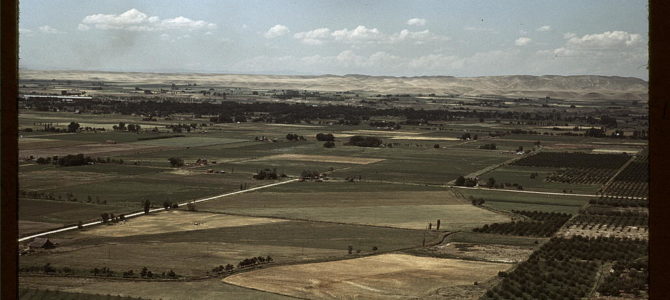
When I learned in high school that Hillary Clinton had written a book called “It Takes A Village,” it ruined the phrase for me. As a good disciple of rugged American individualism, I resented the concept as basically closet communism.
Conservatives and libertarians rightly celebrate the accomplishments of individuals, glorifying images of self-sufficient mountain men and self-made businessmen. We admire the opportunities that a free market provides for people to create their own success. America is, after all, built on the idea that anyone can climb the ladder of progress and prosperity.
But when individualism goes so far as to sever the roots that anchor the individual in his local community, he simply becomes dependent on something else. When he stops shopping in his local hardware store, he starts ordering from Amazon. When county commission meetings seem defunct, he looks to the federal government to solve his problems.
Too many conservatives shirk the idea of community interdependence because it sounds too much like a leftist assault on capitalism and personal responsibility. Grace Olmstead’s new book “Uprooted” challenges that view, reclaiming localism and community interdependence as the conservative causes they are.
A native of the small farming town of Emmett, Idaho, Olmstead moved to Northern Virginia for college, where she and her husband still live. Researching for the book, she traveled back home, documenting the handed-down stories of her great-grandparents and their neighbors. Examining the threat of “brain drain” in rural farming communities, she wrestled with her own responsibility to her hometown.
“In my first few years living in Washington, DC, I wrote many articles defending broken places…fighting for towns experiencing postindustrial collapse or brain drain,” Olmstead writes. “I didn’t even consider the fact that I was one of the kids that had blown away.”
The book is also an appreciative eulogy for previous generations. Recalling Wallace Stegner’s division of transient “boomers” who go where the winds of progress blow and “stickers” who put down roots, Olmstead celebrates the stickers who built her hometown.
Her stories of the farmers who settled Emmett and those who continue to put down roots there are sometimes tragic and always charming. When her newlywed great-grandparents bought their farmhouse, she says, they had mere dollars in their pockets and had to watch when their neighbors left the fields for a lunch break because they couldn’t afford a clock.
Now, the farmhouse is home to Emmett natives Terry and Ashley Walton and their five young children. Every year since their first child was born, they’ve loaded the whole family onto Terry’s combine at harvesttime as it makes its way through the fields.
Interwoven with the success stories are also hardships and loss. Olmstead shares the story of Lucy and Joe Lourenco, who moved to Emmett from Portugal as newlyweds in the 1980s. In 1993, a snowstorm almost ruined the Lourencos’ fledgling dairy farm.
After almost 30 years of overcoming bad weather and economic hardship, the Lourencos decided to downsize and sell their dairy in 2019. They aren’t alone; half of American dairy farmers disappeared between 2000 and 2018, Olmstead reports.
Local communities and especially farming towns continue to struggle as more Americans move their homes to cities, their business online, and their sights toward a vague notion of upward mobility. Those who stay in their hometowns, Olmstead laments, are too often seen as the ones who couldn’t “keep up.”
“Wealth is no longer built through allegiance to a community or a town,” she says. “It is increasingly achieved in isolation by individuals and grown through rootlessness, not through loyalty.”
While the individualist virtues of determination, hard work, and personal responsibility are important, they shouldn’t (and don’t have to) lead to a belittling of the role of community roots. Rootedness is foundational in the philosophies of conservative giants like Edmund Burke, who emphasized the obligations that every person has to the people around him and the ancestors who have gone before him.
Rootedness is also intricately woven into the fabric of federalism and limited government. Nationalization and globalization, on the other hand, emphasize the relationship between a citizen and the government — and the government’s place in solving problems, providing rights, and policing disagreement. Localism combats that, reinforcing the ties of loyalty between people that transcend political allegiances.
In the Emmett, Idaho that her great-grandfather knew, Olmstead writes, “Life was a given thing: poured out and then offered back in a list of dependencies and debts so long, it could never be settled. It was never meant to be.”
Those neighborly dependencies and debts are not antithetical to conservatism, but foundational to it. The ties of community around us are what keep us going far more effectively — and far more lovingly — than federal programs and handouts can.
While many conservatives feel they are fighting a losing battle on the national scale, many of our most important tasks are those we tackle in our immediate communities with the people surrounding us. They are in church potlucks and county fairs — in cultivating liberty and loyalty at home.
“Wherever we decide to live, we must learn to stick: choosing to invest ourselves in place, to love our neighbors, to leave our soil a little healthier than it was when we arrived,” Olmstead says. “Every place will be imperfect. Our own efforts at living well in place will be imperfect. But love suggests that we ought to keep trying anyway: to keep sowing seeds of service and generosity in the lands we love.”
“Uprooted” is available here on March 16, 2021. Better yet, buy it at your local bookstore, which you can do online at IndieBound.org.









